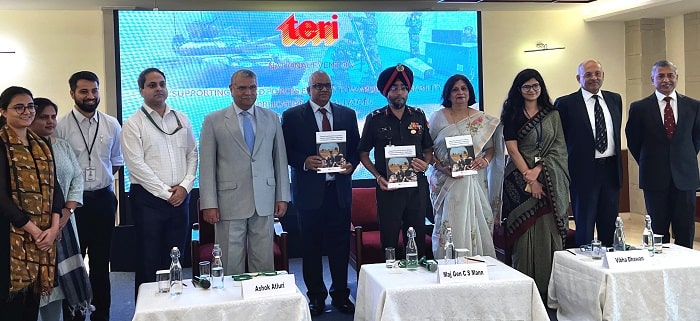Simulators Offer Cost-Effective and Sustainable Solution to Training Challenges in the Defense Sector, Says TERI Study
The report titled ‘Supporting Armed Forces Efforts Towards Sustainability: Application of Simulators in Military Training’ by TERI highlights the potential of simulator technology to reduce greenhouse gas (GHG) emissions in India’s military while improving training efficiency.
The launch event, titled “Accelerating Sustainable Training in the Armed Forces: A Simulator-Based Approach,” took place on World Environment Day. Major General C S Mann, VSM, Additional Director General, Army Design Bureau, emphasized the innovative approach of using simulators to contribute to environmental conservation and mitigate the defense sector’s GHG emissions.
Simulators offer a cost-effective alternative to on-field training, which is becoming increasingly challenging due to limited land availability. Dr Vibha Dhawan, Director General of TERI, pointed out that simulators can minimize the consumption of ammunition and fuel, leading to a more sustainable future for the armed forces.
Simulators can bridge the gap in training personnel on sophisticated weapon systems without the need for live firing, reducing the release of toxic gases into the atmosphere.
ALSO READ: World Environment Day: Know Sustainable Initiatives by Taj Mahal and Taj Palace
Mr Ashok Atluri, Managing Director of Zen Technologies, highlighted the benefits of simulators, including cost-effectiveness, speed, sustainability, and improved training outcomes. The study by TERI supports the notion that simulators offer a cheaper and more environmentally friendly way to train armed forces.
While current emissions from the defense sector may be low, it is projected that GHG emissions from defense operations globally will reach 25% by 2050. Mr Souvik Bhattacharjya, Associate Director at TERI, emphasized that increased adoption of simulator-based training can help the military contribute to India’s climate commitments and reduce emissions from the defense sector.
Zen Technologies’ commitment to sustainable practices in defense training aligns with TERI’s vision of a greener and more secure future.
In addition to evaluating the relationship between simulator-based training, training efficacy, and carbon footprint reduction in the defense sector, TERI’s in-depth study aims to assist the armed forces in contributing to India’s national and international climate goals.
ALSO READ: Embrace India’s Green Movement: Top Environmental Products on Amazon India”
The report launch was followed by a panel discussion on ‘Forging a Pathway towards Sustainable Defense Training,’ which explored the potential sustainability impact of the defense sector as India strives to achieve its environmental goals and reduce emissions.
FOLLOW US ON


